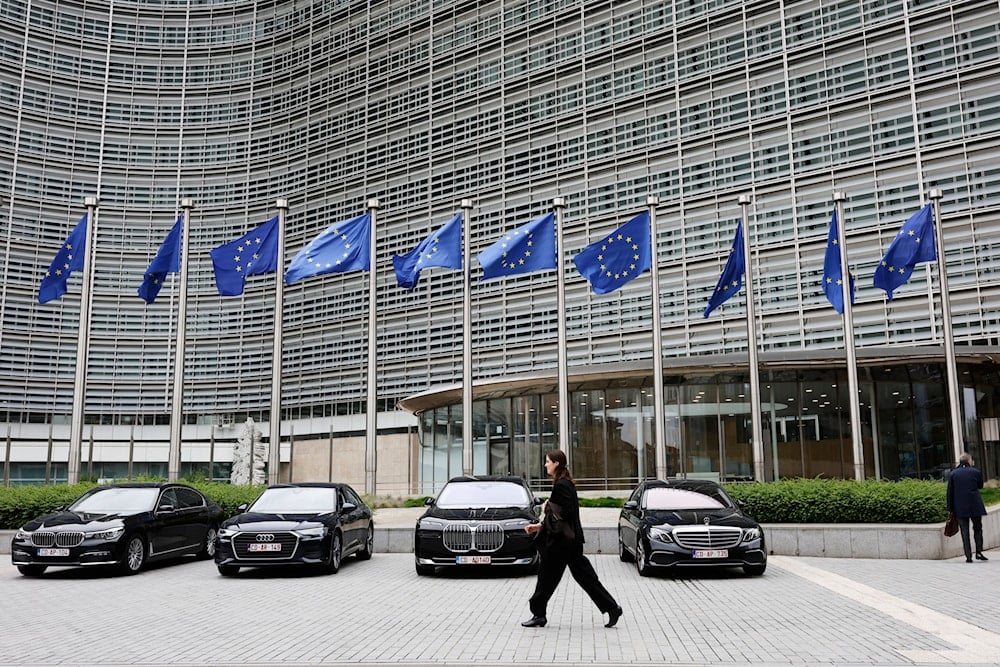Europe confronts 'Israel' over Gaza, but action still remains stalled
As criticism of "Israel" grows across Europe, internal EU divisions and geopolitical concerns continue to hinder any unified response.
-

European Union flags flap in the wind as a woman walks past diplomatic vehicles outside of EU headquarters in Brussels, Belgium, Tuesday, May 27, 2025. (AP)
European discontent with "Israel's" war on Gaza is intensifying, as some of its closest allies issue increasingly sharp public rebukes. Yet, despite the mounting frustration, decisive action remains elusive.
A report by The Washington Post highlights how Europe’s tone has shifted, though implementation of punitive measures continues to lag behind the rhetoric.
A key turning point came when German Chancellor Friedrich Merz, reacting to an Israeli strike on a Gaza school sheltering civilians, declared that the civilian toll could “no longer be justified .......”.
In an uncharacteristically pointed statement, Merz warned "Israel" not to take steps that “its best friends are no longer willing to accept.” The comments marked a rare break from Germany’s longstanding policy of near-unconditional support for "Israel".
In its most serious institutional move yet, the European Union has launched a review of its trade relations with "Israel". Pushed by the Netherlands and backed by a growing majority of the 27 member states, the review is aimed at assessing whether "Israel's" actions in Gaza violate human rights provisions embedded in the EU-"Israel" trade agreement.
Even European Commission President Ursula von der Leyen, known for her historically strong support of "Israel", called the latest phase of the offensive “abhorrent". Meanwhile, countries like Spain are calling for a full suspension of trade ties, and others are distancing themselves from the most visible consequences of the Israeli war on Gaza.
Public pressure and diplomatic tensions grow across Europe
While European pressure on "Israel" continues to grow publicly, officials admit privately that meaningful punitive action remains politically challenging. The bloc’s internal divisions, between pro-"Israel" countries such as Hungary and staunchly pro-Palestinian ones like Ireland, remain a barrier to consensus.
Spanish Foreign Minister Jose Manuel Albares cited “the level of violence” and “acts even against the most basic sense of humanity," including withholding food and images of starving children, as driving forces behind Europe’s evolving stance. He added that "Israel" shows “no will to use diplomacy.”
Nathalie Tocci, head of Italy’s Institute of International Affairs, stated that the explicit nature of the war goals, including plans to reoccupy Gaza, is leaving European governments with “nothing to hide behind.” A European diplomat echoed the sentiment, saying, “We’re reaching the end of what we can bear.”
Arms, aid, and accountability: Europe’s dilemma
Despite being the largest international donor to Palestinians, the EU has been unable to deliver adequate aid to Gaza, as "Israel" has blocked entry for months, as per the report. A controversial delivery mechanism, bypassing the UN and linked to Israeli and US firms, has drawn sharp criticism. EU foreign policy chief Kaja Kallas condemned the approach, stating, “Humanitarian aid cannot be weaponized.”
At the same time, Europe’s leverage remains largely unexercised. The EU is "Israel’s" largest trading partner, and Germany is its second-largest arms supplier. Though Merz acknowledged Germany’s historical caution, Foreign Minister Johann Wadephul warned that this support “should not be exploited,” hinting that Berlin may reevaluate its defense relationship.
Countries including France, Spain, and the UK have increased pressure. France and Britain have sanctioned Israeli settlers, while Spain’s Prime Minister, Pedro Sanchez, has advocated for an arms embargo and suspension of EU-"Israel" ties. France is also debating recognition of a Palestinian state.
EU divided, but pressure mounts
The EU-"Israel" trade review has already triggered “very active lobbying” from Tel Aviv, the piece argued. The Israeli Foreign Ministry has called the review a misunderstanding of the “complex reality.”
However, European diplomats indicate that pressure from constituents is mounting. “If Netanyahu’s government does not change course,” one EU official stated, “the pressure will continue to grow from our voters, from citizens to do something.”
Belgian Foreign Minister Maxime Prevot offered the EU’s sharpest rebuke yet, saying, “My personal view is that it very much looks like genocide. I don’t know what other horrors must unfold before this word can be used.” While calling for sanctions, he acknowledged broader support would be necessary.
In a letter to EU leadership, a group of anonymous staffers identifying as “EU Staff for Peace” welcomed the trade review but condemned the delay. “This long-awaited decision comes devastatingly late for thousands killed in Gaza,” the letter read.
Read more: EU officials slam bloc for taking 'no action' on Gaza

 4 Min Read
4 Min Read








